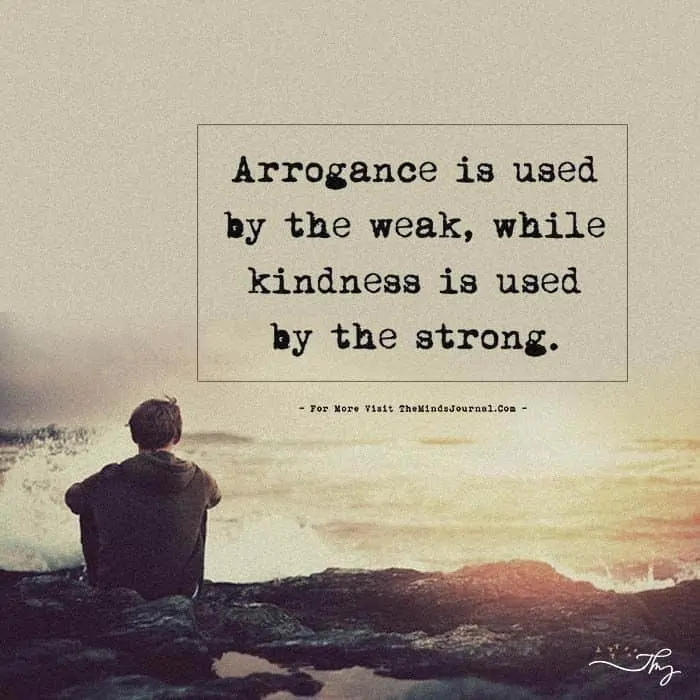If you have ever had to deal with arrogant people, you will know just how exasperating and annoying it can be. But fortunately, there are certain ways that can help you deal with people who have arrogance seeping out of their pores.
In my understanding, happiness is not a feeling, but the experience of interrelatedness and focused attention. One of the ways to be unhappy is to inhibit our innate ability to relate to people and prevent a sense of “togetherness.” This happens when we are arrogant.
Arrogance creates interpersonal distance and is defined by the Cambridge dictionary as “the quality of being unpleasantly proud and behaving as if you are more important than, or know more than, other people.”1
Arrogance is weaponized pride if you will. Unlike healthy pride — an appropriate celebration of personal or communal accomplishment — it pushes people away.
How do we know the difference between pride and arrogance? After dealing with an arrogant person, we do not feel like rejoicing. Something warns us that the other might or already does harm us to keep alive his or her alleged superiority.
While arrogance can remain a hidden, temporary, and for some a relatively harmless quality, it can also lead to spreading rumors, poisoning the well, attempts to ostracize others, and overt abuse.
Just as no one likes a braggart (see 5 Ways to Deal with Someone Who Never Stops Bragging) no one really likes arrogant people. They tend to throw out toxic darts to assert their position of imagined superiority — and make no mistake about it, their superiority is indeed imagined. Even if they knew more, which often they do not, life cannot be measured.
Life is a splendid non-thing that escapes definition and category; levels of skill do not translate to levels of worth. We reflect the glory of life, but one cannot claim a greater piece than another. The glory is indivisible.
However, such insight protects only so far against arrogant toxicity. What can we do when encountering an arrogant person? Hate or gossip brings short-term relief but long-term unhappiness. Here are some suggestions that preserve your own sense of interrelatedness and mental focus (happiness) while still standing strong and confidently against the consequences of harmful arrogance in your life.
Related: The Most Arrogant Zodiac Signs, RANKED
Here Are 6 Ways To Deal With Arrogant People

1. Be compassionate, but don’t try to fix the person.
The need for superiority is deeply rooted and ranges from low self-esteem to an unquenchable thirst for praise to a lack of empathy for those who are or appear to be less accomplished. Only the arrogant person can confront such a problem with sustained effort.
On the other hand, and as always, it brings peace to your heart and potentially to the situation if you can have compassion for the unhappiness of others.
2. Accept the fact that the other indeed feels superior.
There is nothing you can do in the future or have done in the past to make him or her arrogant. He or she suffers from a problem that goes far beyond you. Most important, understand that accepting feelings of superiority in another person does not mean that you must feel inferior in turn. Look at it as a game that you can refuse to play.
3. Communicate directly.
Sometimes it is advisable to tell the other person how s/he came across. It is good to remind an arrogant person that no one knows that much-considering life’s mysteries and that no one can claim absolute truth. As long as it does not harm you later, do not suppress yourself.
Use disarming sentences such as, “Forgive me for interrupting, but…”, or “Maybe you did not mean to sound arrogant/hurt my feelings/come across as if you are 100 percent right, but… .” If you need more tools for communicating effectively, see A Unified Theory of Happiness.2
4. Involve a mediator or a greater number of people.
Sometimes direct communication backfires, which is why you might want to include a third party to help diffuse the situation. Without being vindictive, stand up for yourself under the guidance of someone else.
Seek the support you need. Sometimes you might have to find allies and stand together against a particularly harmful arrogant person or persons.
5. Reduce the harm by setting limits.
We cannot always choose with whom we work and must deal with, but we can set limits. Before meeting with an arrogant person, decide how much time you will spend together and about what subjects you will or will not speak about.
Be disciplined and resist biting any hooks that would prolong the allotted time or cover more territory. If you cannot keep distance despite great effort, maybe it is time to plan to sever the ties. Nobody should remain silent and endure abuse, whether in a personal or professional relationship.
Related: 10 Types of Toxic People You Should Avoid At All Costs
6. Be mindful.
Whatever you decide to do, do things deliberately, thoughtfully, and with as much love as possible. Arrogant people cause others to lose their temper and become their worst selves.
Observe your reactions with self-compassion and your long-term interest in mind. Play the game of your life instead of trying to fit into someone else’s. Stay true to yourself, always.
© 2020 Andrea F. Polard, PsyD. All Rights Reserved.
References:
1) https://dictionary.cambridge.org/dictionary/english/arrogance 2) See Polard, A.F. (2012). A Unified Theory of Happiness: An East-Meets-West Approach to Fully Loving Your Life. Boulder: Sounds True, Chapter 6 "Connection", p 91-125.
Written By Andrea F. Polard Originally Appeared In Psychology Today










Leave a Reply
You must be logged in to post a comment.